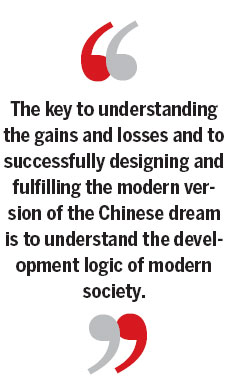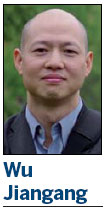Decoding the myths of China's progress
Updated: 2013-07-12 08:47
By Wu Jiangang (China Daily)
|
|||||||||||

Modernism should be the cornerstone of the new Chinese dream
Two years ago, China overtook Japan as the world's second-largest economy and by the end of last year China's per capita GDP was higher than 70 percent of the global population. What this meant was that after some 35 years, Chinese citizens could now aspire to a much bigger dream.
Chinese dreams for many centuries were often limited to owning small pieces of land and governed largely by Confucianism and the tenets of the emperors. During the last century, Chinese dreams were often distorted due to famine, internal conflict, foreign invasion and political chaos. Thankfully, many of these aspects have vanished, and one can safely say that the Chinese dream is modern and contemporary.
Though there is debate about the modern Chinese dream, it is important to learn from the experiences and lessons of the last 35 years. The key to understanding the gains and losses and to successfully designing and fulfilling the modern version of the Chinese dream is to understand the development logic of modern society.
When rural areas become cities, farmers become citizens and even workers become employees of agriculture companies. In other words, traditional farming society becomes a modern society. Such a society is based on entrepreneurship, market mechanism and limited government, all of which are balanced and regulated by a well-defined fair and reasonable legal system or an institutional framework.
Entrepreneurship is the source of creativity for a society's development. It comes from the human desire to chase a dream. People are born to search for aims in life and to pursue their dreams and the way they fulfill their dreams in modern society is to use entrepreneurship, which means a readiness to take risks, acumen in speculating, the spirit of innovation, excellence at execution, and social responsibility.
But individual entrepreneurship alone is not enough for this, and people need to help each other. Mutual benefit happens in free trade. When two people make a deal by their own choice, they both benefit from it - or they will refuse such a deal. Market mechanism provides an incentive to encourage one to do one's best to deliver better goods or services.

In fact, there are always some people who think they can add benefit for themselves by reducing it for others. These people who bypass the logic of the free market are actually using the logic of gangsters, which can appear in various forms. Some are obvious crimes, such as fraud, theft and robbery; others are undercover, such as monopoly, pollution and inflation.
To protect the logic of the free market, modern society often needs a government. A lack of government supervision can be the ideal fodder for gangsters. But if the government is strong, then no one can challenge its power. A strong government can also enact laws to legalize such damages.
But government is not the final solution. To balance the power of government, protect the logic of the free market and encourage entrepreneurship, modern society needs to introduce many institutional safeguards.
The shared dream of every country may differ in nationality, but they will converge in modernism. The dream of the offspring of peace-loving, hardworking and non-aggressive laborers may emphasize a strong country and a peaceful rise, but as a society becomes modern, it also needs to personify modernism and abide by the logic of modern society to set up an institutional framework in which one's dream can be decided by oneself, protected from harm by others and realized by helping others to realize their dreams. For the world's most populous country, the realization of such a dream will be a blessing not only for every Chinese but also for the whole of mankind.
The author is a lecturer at the Management School of Shanghai University and a research fellow at the China Europe International Business School Lujiazui International Finance Research Center.
(China Daily European Weekly 07/12/2013 page11)
Today's Top News
List of approved GM food clarified
ID checks for express deliveries in Guangdong
Govt to expand elderly care
University asks freshmen to sign suicide disclaimer
Tibet gears up for new climbing season
Media asked to promote Sino-Indian ties
Shots fired at Washington Navy Yard
Minimum growth rate set at 7%
Hot Topics
Lunar probe , China growth forecasts, Emission rules get tougher, China seen through 'colored lens', International board,
Editor's Picks

|

|

|

|

|

|





